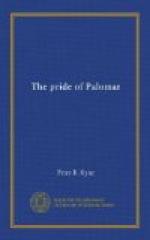For the first time in sixty years, Pablo Artelan, the majordomo of the Rancho Palomar, was troubled of soul at the approach of winter. Old Don Miguel Farrel had observed signs of mental travail in Pablo for a month past, and was at a loss to account for them. He knew Pablo possessed one extra pair of overalls, brand-new, two pairs of boots which young Don Miguel had bequeathed him when the Great White Father at Washington had summoned the boy to the war in April of 1917, three chambray shirts in an excellent state of repair, half of a fat steer jerked, a full bag of Bayo beans, and a string of red chilli-peppers pendant from the rafters of an adobe shack which Pablo and his wife, Carolina, occupied rent free. Certainly (thought old Don Miguel) life could hold no problems for one of Pablo’s race thus pleasantly situated.
Coming upon Pablo this morning, as the latter sat in his favorite seat under the catalpa tree just outside the wall of the ancient adobe compound, where he could command a view of the white wagon-road winding down the valley of the San Gregorio, Don Miguel decided to question his ancient retainer.
“My good Pablo,” he queried, “what has come over thee of late? Thou art of a mien as sorrowful as that of a sick steer. Can it be that thy stomach refuses longer to digest thy food? Come; permit me to examine thy teeth. Yes, by my soul; therein lies the secret. Thou hast a toothache and decline to complain, thinking that, by thy silence, I shall be saved a dentist’s bill.” But Pablo shook his head in negation. “Come!” roared old Don Miguel. “Open thy mouth!”
Pablo rose creakily and opened a mouth in which not a tooth was missing. Old Don Miguel made a most minute examination, but failed to discover the slightest evidence of deterioration.
“Blood of the devil!” he cried, disgusted beyond measure. “Out with thy secret! It has annoyed me for a month.”
“The ache is not in my teeth, Don Miguel. It is here.” And Pablo laid a swarthy hand upon his torso. “There is a sadness in my heart, Don Miguel. Two years has Don Mike been with the soldiers. Is it not time that he returned to us?”
Don Miguel’s aristocratic old face softened.
“So that is what disturbs thee, my Pablo?”
Pablo nodded miserably, seated himself, and resumed his task of fashioning the hondo of a new rawhide riata.
“It is a very dry year,” he complained. “Never before have I seen December arrive ere the grass in the San Gregorio was green with the October rains. Everything is burned; the streams and the springs have dried up, and for a month I have listened to hear the quail call on the hillside yonder. But I listen in vain. The quail have moved to another range.”
“Well, what of it, Pablo?”
“How our beloved Don Mike enjoyed the quail-shooting in the fall! Should he return now to the Palomar, there will be no quail to shoot.” He wagged his gray head sorrowfully. “Don Mike will think that, with the years, laziness and ingratitude have descended upon old Pablo. Truly, Satan afflicts me.” And he cursed with great depth of feeling—in English.




